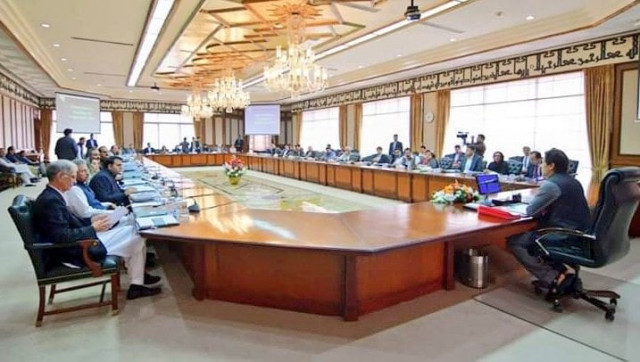Cabinet decides to go public with IPPs report
Asad Umar says a commission will conduct a forensic audit and submit its findings in 90 days

File photo of PM Imran Khan chairing federal cabinet meeting. PHOTO: RADIO PAKISTAN
“The commission will conduct a forensic audit and submit its findings in 90 days,” Federal Planning and Development Minister Asad Umar announced after the meeting.
It was Umar who pushed for making the report public despite the energy ministry’s concerns that the move might have implications for Pakistan’s relations with other countries.
“It [forensic audit] will be aimed at narrowing down those responsible for the irregularities [in the power sector],” the minister said, adding that action would be taken on the recommendations of the commission no matter who was found guilty of wrongdoing.
“None of the decisions, raised as dubious in the report, were taken by the incumbent government,” Umar maintained. “The government doesn’t want anyone’s media trial. We want decisions to be taken as per law.”
A nine-member committee headed by former chairman of the Securities and Exchange Commission of Pakistan Mohammad Ali was formed last year to investigate reasons behind the high cost of electricity, especially in connection with IPPs.
According to the report prepared by the committee, deals were signed at the expense of interests of the consumers and the government. The national exchequer suffered a loss of over Rs4 trillion in the last 13 years because of circular debt and subsidies being given to power producers.
The report further disclosed that 16 IPPs invested around Rs51.80 billion and earned over Rs415 billion in profits – having dividends taken out in excess of 310 billion -- in a period ranging from two to four years.
“Pakistan has regionally the highest power tariffs consequently raising the cost of manufacturing,” read a summary of the report. “This has been one of the prime reasons for loss of competitiveness of our industry and the stagnation of our exports,” it read.
It was noted that the profits generated by most of these IPPs were 18.26 times than their investment and the dividends taken out were 22 times higher.
Six companies earned an annual return on equity (ROE) between 60% and 79%. Four of them earned an ROE of 40%.
The report further revealed that 13 residual fuel oil- and gas-based plants in the last eight to nine years of their operations earned profits of Rs203 billion against their combined investment of Rs57.81 billion.
Excess payments of 6.33 billion to four bagasse-based plants were also identified.
“Coal companies with government connivance obtained a tariff which is more than 50% higher than the market rate leading to an annual over payment of $477 million per annum or $14.5 billion over the life of these projects,” the report read.
“Thermal IPPs set under the 2002 Power Policy and Nepra [National Electric Power Regulatory Authority] tariff determination were entitled to a 15% rate of ROE on a cost plus basis. However, the projects set up under this policy have been posting returns in dollar terms in excess of 50%. This could only have been possible if the tariff setting process of Nepra was compromised.”
It was noted that the Quaid-e-Azam Solar Park was instrumental in getting a very high upfront tariff for solar power approved at US cents 14 levelised and 18 cents for first 10 years through influence peddling and corruption.
The solar tariff in India at that time was between 7-8 cents with similar cost structure, while a much higher upfront tariff and capital cost allowed by Nepra, causing a massive loss to the country.
“The first project in the Quaid-e-Azam Solar Park established by the Punjab government involved a kickback of approximately $50 million,” the document read.
The committee found that private companies had provided false oil statistics to secure better tariffs.
Malpractices by IPPs with respect to project setting up costs, actual fuel use being less than the invoices submitted to Nepra, kickbacks in commission on fuel were also identified.
The report suggested that the power tariffs could be cut down by Rs3 per unit by adopting three measures: converting the payment to IPPs from dollar to rupee, switching from “take-or-pay” to “take-and-pay” option, and reducing capacity payments.
On Friday, the prime minister handed over the responsibility of the report to Umar after taking it back from his Special Assistant Shahzad Qasim. The names of prime minister’s aides Razak Dawood and Nadeem Baber are among the beneficiaries of the investors’ favoured deals, although nothing illegal has been committed.


1724319076-0/Untitled-design-(5)1724319076-0-208x130.webp)
















COMMENTS
Comments are moderated and generally will be posted if they are on-topic and not abusive.
For more information, please see our Comments FAQ